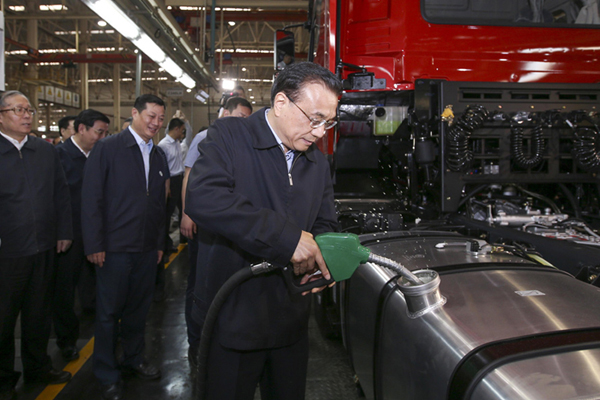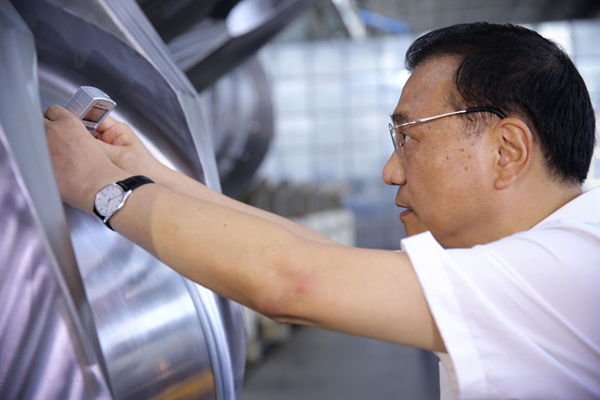The “Made in China 2025” strategy first appeared in the Government Work Report delivered by Premier Li Keqiang in 2015, and its aim is to pursue innovation-driven development, applying smart technologies, strengthening foundations and pursuing green development to upgrade China from a manufacturer of quantity to one of quality.
Since then, it has been among the key works of the State Council. In May 2015, a 10-year action plan on the strategy was released; in 2016, the State Council issued a guideline on improving the consumer products industry, and this July, a State Council executive meeting decided to set up national demonstration zones to implement “Made in China 2025”.
An article written by two senior officials from the United Nations hailed China’s strategy, saying it is leading the country’s industrial modernization process. Forbes reported the strategy could help China’s manufacturing maintain international competitiveness. Klaus Schwab, founder and executive chairman of the World Economic Forum, said the growing smart manufacturing sector will help China become “the leader in the fourth industrial revolution”.

To further implement the Made in China 2025 strategy, supply-side structural reform should be expanded, and innovation-driven development and policy incentives should be strengthened. Smart manufacturing should become the main development direction, integrating with the Internet Plus initiative, and mass entrepreneurship and innovation. Demonstration zones should be established to upgrade manufacturing as intelligent, green and service-oriented.
-- At a State Council executive meeting on May 17, 2017
I would like to support Chinese equipment, and I hope you will give support to the country by creating a golden brand, which will never fade.
-- During an inspection at a plant of China CNR Corp in Changchun, Jilin province, on April 10, 2015
Promotion of the Made in China 2025 strategy should be accelerated to maintain the medium to high speed of China’s economic growth, and push China’s economy to reach medium to high levels.
-- During a tour of J-TECH CNC Machinery Co in Quanzhou, Fujian province, on April 23, 2015

The traditional Made in China should continue. However, the core of Made in China should be Chinese equipment, featuring information technology and smart manufacturing.
-- Meeting with members of the Global CEO Council in Beijing, June 9, 2015
Industrial manufacturing is an important pillar of the national economy, and the key to achieving economic upgrades. The purpose of Made in China 2025 is to upgrade the industry to create new economic drivers.
-- Visiting the Ministry of Industry and Information Technology, June 15, 2015
As an old Chinese saying goes, ‘Great things can be achieved by pooling all the talent,’ through entrepreneurship and mass innovation, we can stimulate market vigor, thus promoting the intelligent transformation of made-in-China products.
--At a State Council executive meeting on June 17, 2015
With big size, high accuracy and advanced technology, it (a marine crankshaft with the longest stroke in the world) is a ‘bulky guy with great wisdom’. The key to the Made in China 2025 strategy lies in intelligent transformation of manufacturing industries.
--Inspecting DHI DCW Group Co, a heavy machinery manufacturer in Dalian, in September 2015
The combination of the internet and Made in China 2025, supplemented by mass innovation and entrepreneurship, is expected to trigger a new Industrial Revolution.
--At a State Council executive meeting on Oct 14, 2015
By enhancing international cooperation in innovation, such as linking the Made in China 2025 strategy with Germany’s Industry 4.0 strategy, we can learn from each other and complement advantages.
--At a State Council executive meeting on Jan 27, 2016
I’m not only encouraging Dongfeng company, but also encouraging Made in China. We need quality reform to promote the upgrade of Chinese manufacturing.
--At a heavy truck plant of Dongfeng Commercial Vehicle Co in Shiyan city, Central China’s Hubei province, on May 23, 2016
I would like to advertise Chinese bicycles and am more willing to support the intelligent upgrading of the Made in China 2025 strategy.
-- During a visit to a Flying Pigeon bicycle experience store in Tianjin on June 26, 2016
High-powered tractors are necessary for modern agriculture, just as high-powered engines are for the Made in China 2025 strategy.
--At Kaifeng industrial park of Zoomlion, a heavy industry sci-tech company, on May 8, 2017
In implementing the Made in China 2025 strategy, the government should not limit its support to big companies. Related policies and support measures should also back small and middle-sized ones to promote integrated development among big, medium and small companies.
--At a State Council executive meeting on May 17, 2017
The Made in China 2025 strategy is not aimed at not buying foreign equipment in the future. It is impossible, as China’s open market will allow enterprises to have more autonomy in making decisions. More important, in the context of globalization, equipment manufacturing quality cannot be improved with closed doors.
--Meeting enterprise representatives at Summer Davos Forum on June 28, 2017
Implementing the Made in China 2025 strategy needs both breakthroughs in technology and continuous innovation in system and mechanism.
--At a State Council executive meeting on July 19, 2017
